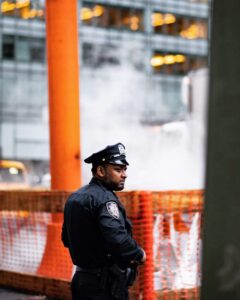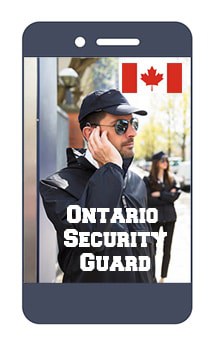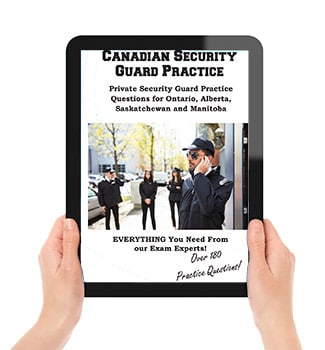What is a Security Guard?
Security guards are trained professionals responsible for maintaining a safe and secure environment for people, property, and assets. They are employed by security companies and government agencies to provide security services for businesses, events, and public spaces.
They are trained in areas such as emergency procedures, loss prevention, and armed security. Becoming a security guard in Canada requires fulfilling certain basic requirements and completing a mandatory training programs to obtain the necessary license to work in the security field.

Benefits of Being a Security Guard
- Make a Difference – As a security guard, you have a unique opportunity to make a difference in your community by helping to keep people safe.
- Flexible Schedule and Job Opportunities – Security guards enjoy a very flexible schedule, working different hours, part-time or full-time, and can work in many different settings such as hospitals, airports, and malls, among others.
- Work with Law Enforcement – You will have a chance to work alongside law enforcement. Security guards are trained to work with law enforcement agencies, assisting the police in emergency situations.
- Lots of room for Growth – Security guards enjoy considerable scope for growth and advancement in the security industry. With experience as a security guard, you can progress to higher-level security service occupations, such as a loss prevention officer or an armed security guard.
- Career Advancement – Security guard positions often provide opportunities for career advancement. Experienced guards can progress to supervisory or management roles, where they may oversee a team of security personnel or have additional responsibilities in security planning and risk management. Advancement may also involve acquiring specialized skills and certifications in areas such as crowd control, loss prevention, or cybersecurity.
Roles and Responsibilities of a Security Guard
Being a security guard comes with responsibilities, all aimed at maintaining safety and security.
Responsibilities – Responsibilities include conducting patrols, monitoring surveillance systems, controlling access to premises, responding to incidents, conducting inspections, preparing reports, and providing customer service.
Vigilance – Security guards provide a visible deterrent by maintaining a vigilant posture and monitoring their surroundings to ensure that their environment is safe.
Visible Presence – By being present and visible, security guards help prevent crimes and can respond effectively in case of any suspicious activities.
Respond to Threats and Emergencies – Security guards are trained to respond to a range of potential risks and threats to ensure the safety and security of people and property. They are trained in emergency procedures, including evacuation and other critical situations, and their role is to ensure that everyone in the vicinity is safe and secure.
Working Conditions – Security guards work in shifts, including evenings, weekends, and holidays, as security needs exist around the clock. They may be required to stand or walk for extended periods, and their work environment can range from indoor settings, such as office buildings, to outdoor locations, such as construction sites. Security guards must remain alert and be prepared to respond to potential security threats or emergencies.
Communication – Effective communication skills are crucial for success in the security industry. Security guards must be able to communicate effectively with their colleagues, management, and members of the public. They need to articulate their observations and describe incidents accurately and clearly, and they must be able to work collaboratively with a range of people to ensure the safety and security of the environment they are working in.
Communication is a big part of the job and a focus of the security guard certification test and the GardaWorld test
Security guards communicate with clients, visitors, or employees, verbally and in writing. They need to communicate effectively, using appropriate language and tone, to provide clear instructions, answer questions, and report any incidents or suspicious activities. Good English language skills enable security guards to communicate professionally and effectively with people from different backgrounds and cultures.
Report Writing – Security guards are required to write clear and concise reports, including incident reports, daily activity reports, and shift logs. These reports must be accurate, detailed, and properly formatted, using correct English grammar and punctuation, so that they can be used as evidence if required. Good English language skills avoid confusion and misinterpretation of information.
Reading Comprehension – Security guards must read and understand various documents such as company policies and procedures, safety guidelines, and incident reports. Good English language skills enable security guards to comprehend these documents and ensure that they are following proper protocols.
Qualifications Needed to Become a Security Guard in Canada
Basic Requirements
Becoming a security guard in Canada requires fulfilling some basic requirements before proceeding with your application. These requirements vary by province, but generally include
Minimum age of 18 – You must be at least 18 years old to become a security guard in most provinces. Alberta, Manitoba, and Saskatchewan require candidates to be at least 19 years old.
Clear criminal record – All provinces require a clear record. A background check is conducted to verify there is no criminal history that would hinder their ability to safeguard people and property. It is also essential to have a clear credit record as many security companies will conduct a credit check during the hiring process.
Physical fitness – Physical fitness is a key requirement. Guards must be physically capable of carrying out their duties, which may include standing for long hours, patrol, and responding to emergency situations. Fitness requirements vary depending on the security company and the province, but it is essential for security guards to maintain good health and fitness levels.
High School Diploma – Educational qualifications are not be a mandatory requirement, most companies prefer candidates with a high school diploma or Canadian Adult Education CAEC. In today’s competitive job market, having good grades and a post-secondary education increases your chances of securing a job in the security field.
Other factors that increase your chances of securing employment from reputable security companies include prior military experience, experience in security-related fields, fluency in multiple languages, and clear criminal and credit records.
Credit Check – Even after fulfilling these basic requirements, candidates must complete mandatory training programs to acquire necessary skills and knowledge to cope with potential threats and respond in emergency situations. Each province in Canada may have different training requirements and regulations, but most security companies require completion of a security guard course approved by the provincial government.
Security Guard Practice and Test Prep – After completing their training program, you must write a certification test. Security guard practice questions here GardaWorld Practice
Criminal Record Check
One of the most crucial aspects of becoming a security guard in Canada is having a clean criminal record. The security industry places a high value on trustworthiness and responsibility on the part of its employees, and a history of criminal activity can quickly disqualify a candidate.
Basic Record Check – To ensure their eligibility, a security guard applicant must undergo a criminal record check by local law enforcement agencies. This is a simple process, where you submit fingerprints and other personal.
Checked again on Renewal – Having a clear criminal record is essential not just to secure a job in the security industry, but also to maintain a security guard license. Most provinces require security guards to renew their license every few years, and this requires passing another criminal record check. If an individual has committed any criminal offenses during the intervening period, their license may be revoked, and they may no longer be eligible to work in the security field.
Type and Severity of Offense are Factors – It is worth noting that not all criminal history will automatically disqualify a candidate from becoming a security guard. The type of offense, the severity of the offense, and the time elapsed since the offense are all factors that are considered. In general, offenses related to violence, theft, fraud, or drug use are disqualifying factors.
Credit Check – In addition to the criminal record check, security companies may also conduct credit checks and background checks on potential employees. This is to ensure that the employee is trustworthy and reliable, and has no outstanding financial or legal issues that could impede their ability to carry out their duties.
Provincial Government Websites for Security Guard Certification
Security Guard Training Programs
Training is Mandatory for a License. Becoming a security guard in Canada requires completing a provincially accredited security guard training program, which is mandatory for obtaining a security guard license in Canada.
Security Guard Training includes:
- Emergency procedures
- The Act and Code of Conduct
- Basic Security Procedures
- The Canadian Legal System
- Legal Authorities
- Communications
- Report Writing
- Health & Safety
- Sensitivity Training
- Use of Force Theory
Report Writing Courses teach security guards how to prepare accurate, concise, and detailed reports on incidents, observations, and other security-related information.
Security guards are required to write clear and concise reports, including incident reports, daily activity reports, and shift logs. These reports must be accurate, detailed, and properly formatted, using correct English grammar and punctuation, so that they can be used as evidence if required. Good English language skills avoid confusion and misinterpretation of information.
Security guards must read and understand various documents such as company policies and procedures, safety guidelines, and incident reports. Good English language skills enable security guards to comprehend these documents and ensure that they are following proper protocols.
Legal Training Courses provide security guards with knowledge of Canadian laws, The Act and Code of Conduct, regulations, and statutes relevant to their work. This training helps security guards act within legal boundaries and avoid issues such as liability, infringement, and litigation.
Times Vary but Usually 60 hours. The training program duration vary from province to province, so it’s crucial to check your province’s training requirements. For instance, Ontario requires 40 hours of training for unarmed security guards and 60 hours of training for armed security guards. In British Columbia, security guards must complete a 40-hour basic training program before applying for a security license.
Provincial Accreditation – If you are choosing a security guard training program, it is essential to ensure the program is provincially accredited. Accreditation ensures that security guards receive proper training and are adequately prepared to enter the security field.
Security Guard Licensing Exam
Becoming a security guard in Canada requires passing a licensing exam which is provided by the province you plan to work in. The exam is an essential step towards obtaining a security license and working in the security industry. The exam will test your knowledge on various topics including emergency procedures, loss prevention techniques, and other topics relevant to the security field. All of these topics you will have learned about in the training program.
Practice does Make Perfect – It is crucial to understand what the exam entails and how to fully prepare for it. You can expect the exam to cover all relevant laws and regulations surrounding the security industry in your province. This includes topics such as the appropriate use of force, legal authority, and ethical behavior.
Your training program will provide you with materials to study, but it is also recommended that you take practice exams (see also GardaWorld) to familiarize yourself with the exam’s format and types of questions to expect. This will help you identify areas where you may need further study and ensure that you are fully prepared for exam day.
Test Prep – Proper preparation ensures that you will have the knowledge and skills necessary to pass the exam and obtain your security license. How to Prepare for a Test, How to Study

Canadian Security Guard Test (General)
Most tests contain the following sections:
- Introduction to the Security Industry
- The Act and Code of Conduct
- Basic Security Procedures
- Report Writing
- Health & Safety
- Emergency Response Preparation
- The Canadian Legal System
- Legal Authorities
- Communications
- Sensitivity Training
- Use of Force Theory
GardaWorld Test
- English
- Spelling
- Grammar
- Reading Comprehension
- Logic
- Basic Math
- Problem Solving (Word Problems)
- X-ray ORT Test
- Pattern Recognition
GATB – Government and Special Constables
The General Aptitude Test Battery as 4 sections:
Basic Math: fractions, percent, decimal, number operation
Problem Solving: word problems
Vocabulary: synonyms and antonyms
Spatial relations: folding
GATB Information and Practice
Applying for the Security Guard License in Canada
Finding Available Positions
Start with Job Boards – One of the best places to start is by researching security companies and job boards in your area. Online job boards like Indeed, Monster, and LinkedIn often post openings for security guards.
Here are a few to get started.
Indeed Government of Canada Job Bank Linkin Paladin Security
Security Companies – Most have careers pages on their websites, which list job opportunities and application information.
Here are a few:

How to Improve your Chances of Being Hired
To improve your chances of getting hired as a security guard in Canada, consider the following steps:
- Complete relevant security guard training and obtain any necessary certifications.
- Gain experience in related industries or security-related roles.
- Highlight your skills, relevant experience, and any additional qualifications during the application and interview process.
- Maintain a clean criminal record and ensure legal eligibility to work in Canada.
- Network with professionals in the security industry and consider joining industry associations.
- Stay updated on industry trends and advancements.
Different Licenses Required for Different Job Types
Security Guard License – This is the most common type of license required for individuals working in the security industry in Canada. It is issued to unarmed security guards in various commercial and residential settings.
Armoured Car Guard License – The Armoured Car Guard License is required for individuals who work as armed security guards transporting cash and other valuables. The license authorizes the holder to carry and use a firearm while on duty, making it a more specialized form of license. To obtain this license, individuals must undergo a more extensive training program that includes firearms safety, use of force, and emergency response, and other areas. In addition, there is a written and practical exam.
Private Investigator License – The Private Investigator License is required for individuals who want to work as private investigators or in investigative positions within the security industry. This license authorizes the holder to conduct investigations and gather evidence for legal and personal reasons. To obtain this license, individuals must undergo mandatory training that covers topics such as surveillance techniques, evidence gathering, and privacy laws, in addition to a qualifications exam that tests their knowledge on investigative procedures and laws.
Additional Licenses and Certifications – Other licenses and certifications for specialized security positions, such as, a Loss Prevention Employee License is required for individuals who work in loss prevention, while a Police Officer Certificate is required for individuals who want to work in the security operations of a police department.
Paladin Certificate – The Paladin Security Officers Certification, which is issued to employees of Paladin Security, a leading security company in Canada.
Government and Special Constables – The Canadian GATB is a test used in careers as security, special constables, TTC officer, or nuclear security in Ontario. More on GATB
Occupational Outlook and Job Prospects 2021 – 2030
Security Guards are in demand!
For the period 2022-2031, new job openings (arising from expansion demand and replacement demand) are expected to total 45,900 , while 38,100 new job seekers (arising from school leavers, immigration and mobility) are expected to be available to fill them. Includes security related occupations.
Breakdown by province and territory
| Location | |
|---|---|
| Alberta | Good |
| British Columbia | Limited |
| Manitoba | Moderate |
| New Brunswick | Limited |
| Newfoundland and Labrador | Moderate |
| Northwest Territories | Limited |
| Nova Scotia | Moderate |
| Nunavut | Limited |
| Ontario | Good |
| Prince Edward Island | Moderate |
| Quebec | Moderate |
| Saskatchewan | Moderate |
| Yukon Territory | Good |
Security Guard Frequently Asked Questions
The basic requirements to become a security guard in Canada are:
- at least 18 years old
- clean criminal record
- legally eligible to work in Canada
- High-school diploma or Canada GED
Security guards must complete a basic training course, which varies by province and the type of security work you plan to do. A certain number of hours of 'Basic Security Training (BST)' is usually required. Approved training programs can be found on relevant government websites
To become a security guard in Canada, you need some basic requirements. You must be at least 18 years old, a clean criminal record, and being legally eligible to work in Canada. Additionally, a high school diploma or Canadian GED is often required for entry-level positions. More here
You need to be a Canadian citizen, a permanent resident, or hold a valid work permit or visa. Practice for the Canadian Citizenship Test here
Yes, there are specific training requirements to become a security guard in Canada. The training may vary by province or territory. Generally, individuals need to complete a recognized security guard training program and obtain the required certification or license. This training equips individuals with the necessary knowledge and skills for the role.
Working in different sectors such as retail, hospitality, event management, or corporate security can provide valuable experience.
The specific job responsibilities of a security guard in Canada may vary depending on the employer and the industry. However, some common duties include patrolling designated areas, monitoring security systems, controlling access to premises, responding to incidents, writing reports, and ensuring the safety and security of people and property. More info on Roles and Responsibilities
The financial rewards of a career as a security guard can vary depending on factors such as experience, location, and the employer. Generally, entry-level security guard positions may offer a moderate salary, with the potential for salary increases and career advancement with time and experience.
Canada Security Guard Practice test questions prepared by our dedicated team of exam experts!
For Ontario, BC, Alberta, Saskatchewan and Manitoba security guard.
Everything you need to pass the test!
Over 180 Practice Questions with full answer key! Including detailed answer key explaining why the answer is correct – and why the other choices are incorrect!
Practice Questions for :
- Introduction to the Security Industry
- The Act and Code of Conduct
- Basic Security Procedures
- Emergency Response Preparation
- The Canadian Legal System
- Legal Authorities
- Use of Force Theory
Canada Security Guard Practice – Interactive Online Version
PDF Download Version
Date Published: Wednesday, May 31st, 2023
Date Modified: Thursday, November 13th, 2025


 Complete Practice Tests with Full Answer Key
Complete Practice Tests with Full Answer Key